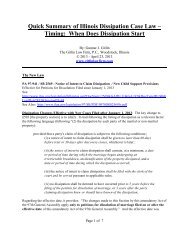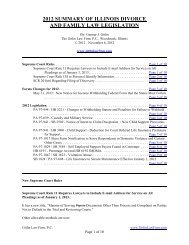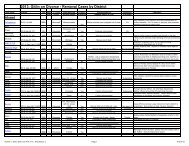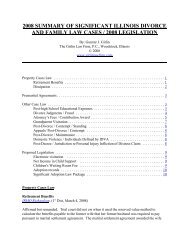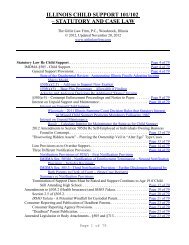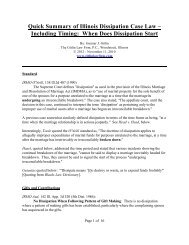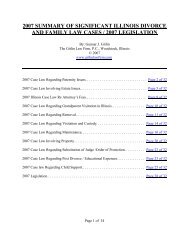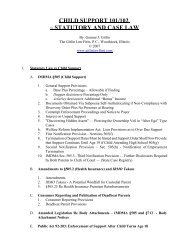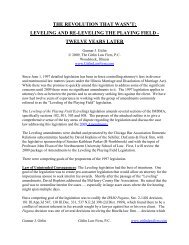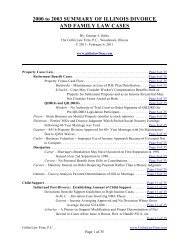Gitlin Law Firm 2008 Illinois Divorce and Paternity Case and ...
Gitlin Law Firm 2008 Illinois Divorce and Paternity Case and ...
Gitlin Law Firm 2008 Illinois Divorce and Paternity Case and ...
Create successful ePaper yourself
Turn your PDF publications into a flip-book with our unique Google optimized e-Paper software.
case. In general, courts have not required that parties seeking to enjoin later-filed<br />
actions demonstrate the existence of the elements typically needed for injunctive<br />
relief in other contexts... Instead, courts have enjoined parties from filing or<br />
proceeding with actions in other <strong>Illinois</strong> courts where (a) either the parties <strong>and</strong> the<br />
legal issues involved are the same or the issues involved in the later-filed action are<br />
of the type that can <strong>and</strong> should ordinarily be disposed of in the course of the<br />
original action; <strong>and</strong> (b) there does not appear to be any proper purpose for the<br />
maintenance of the later-filed action.<br />
The appellate court then noted the general rule that “when two or more actions involving the same<br />
parties <strong>and</strong> the same issues are brought in different venues, "the court first acquiring jurisdiction<br />
retains the jurisdiction <strong>and</strong> may dispose of the entire controversy, <strong>and</strong> no court of coordinate<br />
power is at liberty to interfere with the first court's jurisdiction.” The appellate court noted with<br />
the approval the decision in IRMO Baltzer, 150 Ill. App. 3d 890 (1986), where it affirmed the<br />
injunction against a later-filed action without requiring that the parties seeking the injunction<br />
show the traditional elements for an injunction. In that case, the trial court had entered an<br />
injunction requiring an attorney to file his attorney fee petition in DuPage County, the court in<br />
which the divorce was proceeding, <strong>and</strong> to dismiss his separate Cook County petition. The<br />
appellate court there that duplicative actions waste the resources of the courts <strong>and</strong> litigants.<br />
The appellate court also cited IRMO Schweihs, 222 Ill. App. 3d 887 (1991), GDR 92-18, where<br />
the court upheld the entry of an enjoining the mortgagee of the marital home as a third party in a<br />
divorce case <strong>and</strong> enjoining the dissolution case, enjoining that mortgagee from filing any<br />
foreclosure action in a separate division of the same circuit court – thus requiring it to file the<br />
foreclosure in the dissolution action instead. Finally, however, the court noted but criticized the<br />
language from one case which had IRMO Elliott, 265 Ill. App. 3d at 914, that "[c]ourts use the<br />
same st<strong>and</strong>ards for preliminarily enjoining legal actions as for other preliminary injunctions." The<br />
appellate court stated:<br />
Accordingly, .. We hold that a litigant seeking to enjoin later-filed actions in other<br />
<strong>Illinois</strong> courts need not demonstrate the existence of the factors for typical<br />
injunctions ... <strong>and</strong> may obtain an injunction where: (a) either the parties <strong>and</strong> the<br />
legal issues involved are the same or the issues involved in the later-filed action are<br />
of the type that can <strong>and</strong> ordinarily should be disposed of in the course of the<br />
original action; <strong>and</strong> (b) there does not appear to be any proper purpose for the<br />
maintenance of the later-filed action.<br />
Nessler - <strong>Divorce</strong> Judgments / Fraud<br />
Nessler v. Nessler, No. 4-07-0220 (4 Dist., March 14, <strong>2008</strong>)<br />
th<br />
Reversed <strong>and</strong> rem<strong>and</strong>ed. Nessler is an unusual <strong>and</strong> complex case involving, in part, an action for<br />
money damages caused by the ex-husb<strong>and</strong>’s alleged fraudulent inducement of her execution of the<br />
marital settlement agreement. In this case the parties were married, divorced, remarried <strong>and</strong> then<br />
the remarriage was declared invalid. The ex-husb<strong>and</strong> moved to dismiss the complaint per Section<br />
2-619 of the Code of Civil Procedure. The appellate court noted the allegation in the complaint<br />
that the husb<strong>and</strong>, an attorney, induced her to enter into agreement by misrepresenting to her the<br />
The <strong>Gitlin</strong> <strong>Law</strong> <strong>Firm</strong>, P.C. Page 48 of 55 www.gitlinlawfirm.com




